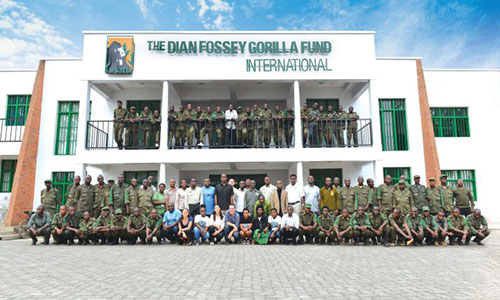Karisoke Research Center: A Stronghold for Mountain Gorilla Conservation
Karisoke Research Center is the world’s leading institution for the study and protection of critically endangered mountain gorillas. Established over 40 years ago by Dr. Dian Fossey, the center has continued to operate since her passing in December 1985. It was founded under the Dian Fossey Gorilla Fund International, formerly known as The Digit Fund, a charitable organization dedicated to the conservation of mountain gorillas. Originally created to finance Fossey’s anti-poaching patrols, the Fund continues to play a crucial role in protecting these great apes. Today, Karisoke remains a vital resource for the conservation of mountain gorillas and a significant support system for the local communities living near their habitat.
Founding and History of Karisoke Research Center
 Karisoke Research Center was founded by Dian Fossey on September 24, 1967, between two of Rwanda’s Virunga Mountains—Mount Karisimbi and Mount Visoke. The center’s name, “Karisoke,” is derived from a combination of these mountain names. Initially consisting of just two small tents, the research station expanded over time into a series of cottages. Unfortunately, due to civil unrest following Fossey’s death, the facilities were repeatedly damaged, rebuilt, and eventually destroyed. Despite these challenges, the critical gorilla monitoring and conservation efforts that Fossey initiated have persisted for over four decades. Today, Karisoke staff protect approximately one-third of the mountain gorilla population in the Virunga region.
Karisoke Research Center was founded by Dian Fossey on September 24, 1967, between two of Rwanda’s Virunga Mountains—Mount Karisimbi and Mount Visoke. The center’s name, “Karisoke,” is derived from a combination of these mountain names. Initially consisting of just two small tents, the research station expanded over time into a series of cottages. Unfortunately, due to civil unrest following Fossey’s death, the facilities were repeatedly damaged, rebuilt, and eventually destroyed. Despite these challenges, the critical gorilla monitoring and conservation efforts that Fossey initiated have persisted for over four decades. Today, Karisoke staff protect approximately one-third of the mountain gorilla population in the Virunga region.
Dian Fossey’s Legacy
A key attraction for visitors to Karisoke is the trek to the Dian Fossey Gravesite. Fossey is buried within the Volcanoes National Park in Rwanda, alongside many of the gorillas she worked tirelessly to protect. Her legacy continues through ongoing conservation efforts, research, and education programs that benefit both the gorillas and the local communities.
Scientific Contributions and Conservation Impact
For decades, Karisoke Research Center has garnered global attention and funding for mountain gorilla conservation. The center has facilitated partnerships between local communities and conservation organizations, supporting initiatives in health, education, and economic development.
Researchers at Karisoke have access to one of the world’s most extensive datasets on mountain gorillas, with over 40 years of recorded information on their behavior, habitat, and life cycle. This long-term study has made significant contributions to primate research, and the data collected has played a crucial role in understanding gorilla ecology and conservation.
Thanks to continuous monitoring and protection efforts by Karisoke staff, the Virunga mountain gorilla population has increased significantly. When Fossey first arrived, only 260 mountain gorillas were recorded. Today, the population has grown to approximately 380, making them the only great ape species whose numbers have risen in recent years. This success is largely attributed to collaborative conservation efforts between Karisoke and national park authorities in Rwanda and the Democratic Republic of Congo.
Ongoing Research and Community Involvement
Karisoke remains at the forefront of mountain gorilla conservation, conducting daily monitoring and research. The center engages in extensive scientific studies, education programs, and community development projects. Since its establishment, Karisoke has generated an unparalleled volume of information on gorilla behavior, social structures, and habitat conservation. This wealth of knowledge continues to attract experts and research students from around the world.
Beyond gorilla conservation, Karisoke serves as a source of livelihood for local communities. The center employs over 100 staff members, most of whom are Rwandan. These employees contribute to gorilla conservation through education, research, and environmental monitoring. Others focus on biodiversity studies, health initiatives, and administrative roles. Additionally, Karisoke’s community outreach programs provide education, economic support, and healthcare services to the surrounding population.
Education and Public Awareness
Karisoke staff actively promote conservation education in local schools, reaching students from primary to secondary levels and even engaging adult community members. Various forms of mass media are used to raise awareness about gorilla conservation. The Dian Fossey Gorilla Fund has also supported the renovation of schools and health clinics near the park. Moreover, they have funded clean water projects and pest control programs, which help prevent the spread of diseases from humans to gorillas while also improving the overall well-being of local residents.
Therefore, Karisoke Research Center stands as a beacon of hope for mountain gorilla conservation. Its extensive research, dedicated conservation efforts, and strong community involvement have contributed significantly to the survival of these endangered primates. By fostering partnerships and ensuring continued protection, Karisoke remains instrumental in safeguarding the future of mountain gorillas and improving the lives of the people who share their habitat.
